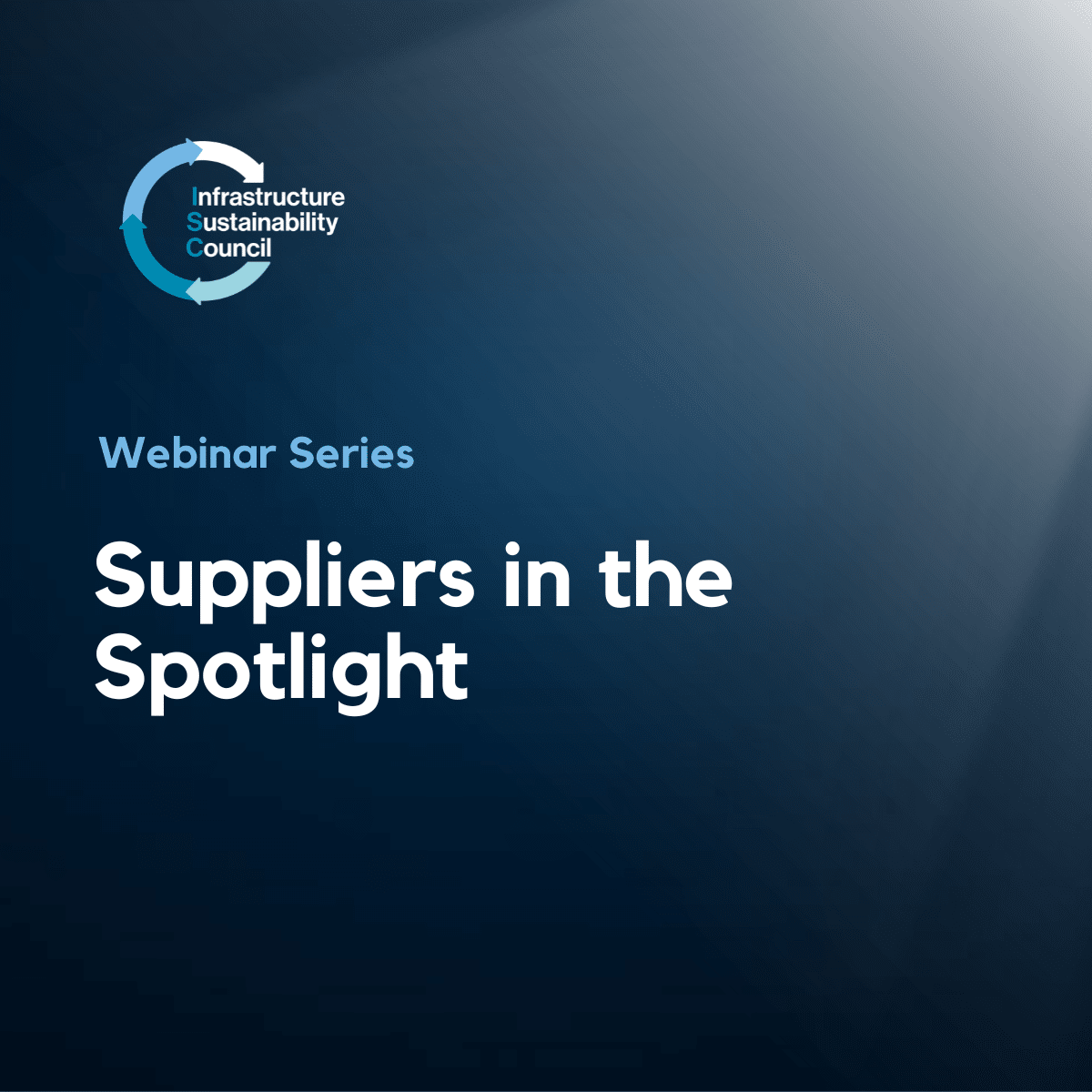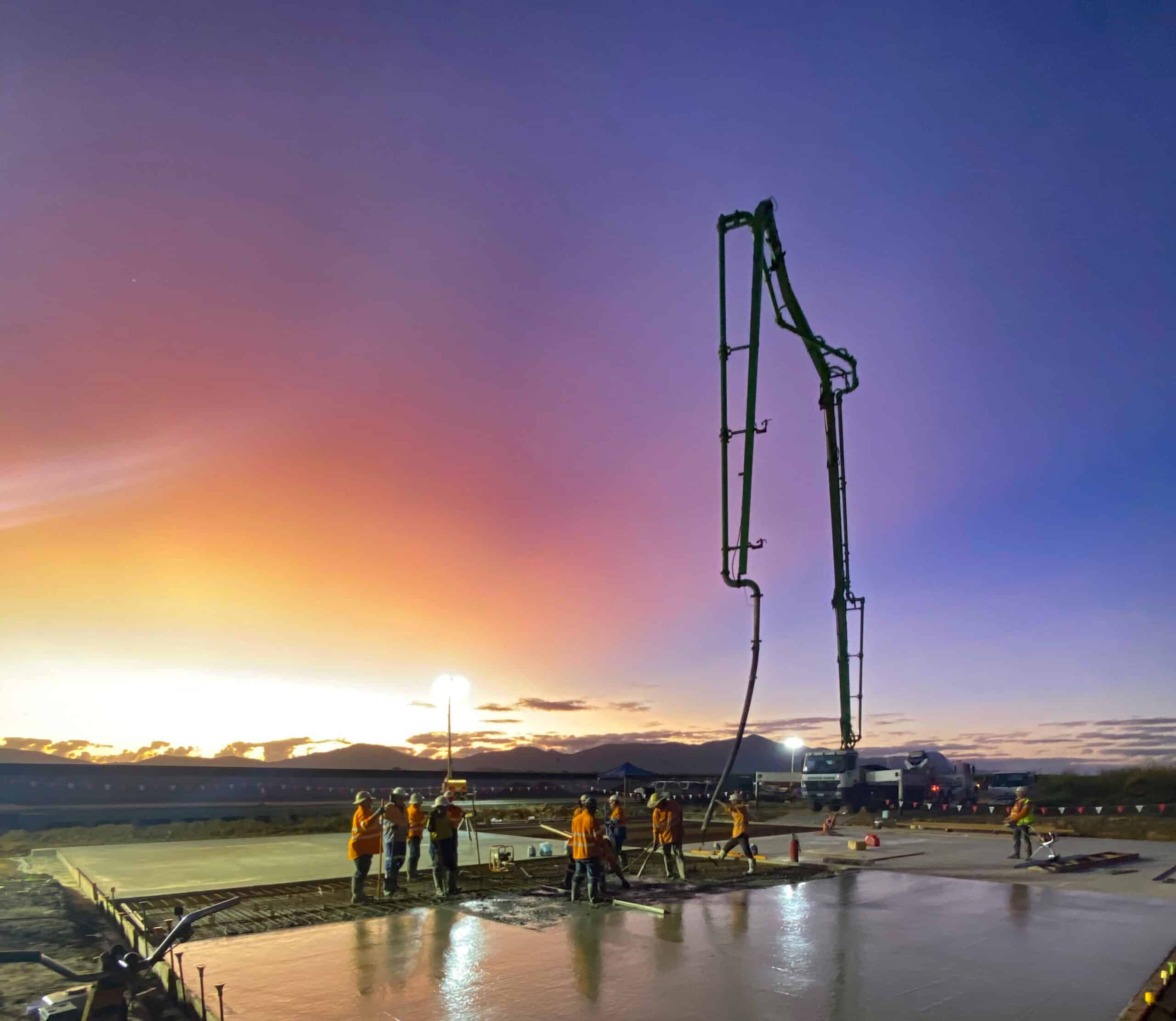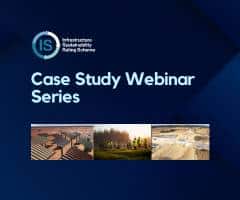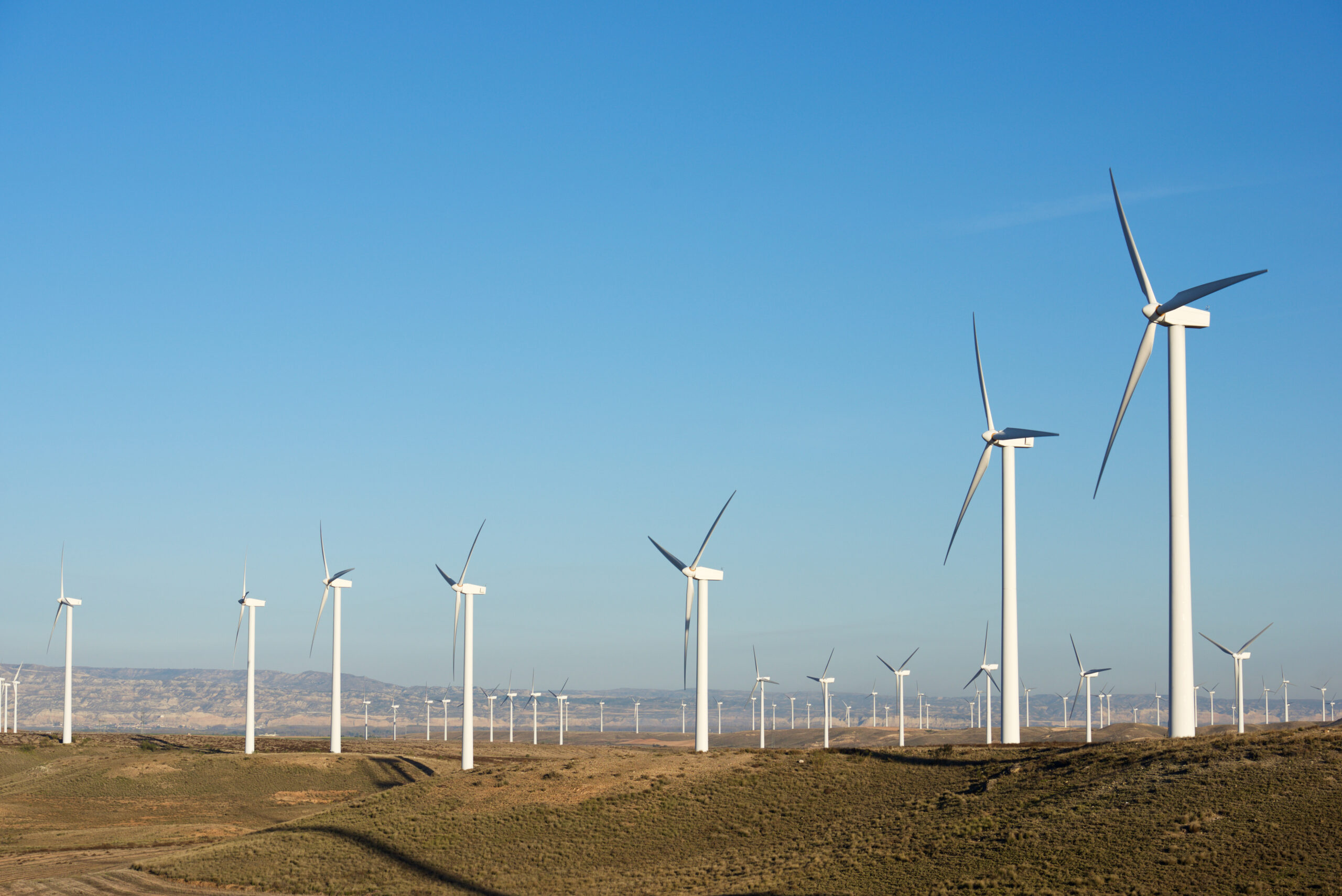A big thank you to all that were able to join the ISC Verification & IS v2.1 Workplan Update Webinar today. It was a good opportunity to share our progress on the continuous improvement work that we have been doing with the industry.
The webinar is available in full via the link below.
Question & Answer’s:
Q. Agree with the comment about weeding out greenwashing, however, the prescriptive nature of the tool in its current form with dozens of ‘must’ statements has (in the past) not recognised good outcomes on projects. For example, an academic ‘perfect world’ scenario of stakeholder engagement does not fit all projects, particular mega-scale (>$1B). Will there be a better focus on flexibility and intent so that real outcomes are recognised versus “ticking a box” for the sake of ISC that adds no value to projects?
A. ISC will seek a balance prescriptiveness, flexibility and scalability through the collection of measures being proposed for verification and v2.1. It is also important to recognise however, that simultaneously ISC are not seeking to reward projects for standard compliance and are still looking to encourage projects to perform better than BAU.
Q. Will the ISC also consider a standard set of BAU Assumptions to inform the Base Case Proposals. A lot of time is spent establishing project BAUs and a starting point or minimum set could help reduce time and cost of using the tools.
A. ISC are proposing several measures that will reduce the work effort by project teams in the Base Case Proposal process. These include:
– Reducing the scope of the Base Case Proposal form,
– Reducing the scope of BAU’s required/presented by projects,
– Improving the review and approval process such that comments are fewer and turnaround times are faster,
– Investigating material available to the ISC that can support with the setting and approval of BAU’s.
Note that the final measure does not necessarily mean that ISC will set BAUs at this stage. ISC’s previous work in this space has identified several fundamental issues with doing this broadly and so our approach must be well considered.
Q. How many ISC Quality Controller positions are going to be established?
A. It is anticipated the 2 full time quality controller positions will be required. These two resources will be supported by a managing team member as well.
Q. Is the quality controller going to have the same training as the verifier? As well, is there going to be a working group between verifiers and quality controls to align on their final verification on different projects?
A. The expected experience and qualifications of the Verifier and the Quality Controller will differ slightly. These will be made publicly available in the Verification Procedure.
With regard to onboarding and training, the Quality Controller resources will need to be familiar with the Verification process as well. Should they not already possess this familiarity, a similar shadow training phase will be required, as it is for the Verifiers.
Q. What are the exact roles/responsibilities of the Quality Controller vs Verifier? Who does what? Would it be right to say the QC has simply replaced one of the verifiers?
A. The Quality Controller role has a different focus and function to the 2nd Verifier.
The quality controller will review the submission as a whole, however, their focus will be on how well the Verifier’s proposed comments align with the verifier principles and technical manual/guidance. Should they identify concerns around alignment, they will flag these and propose an alternative response for the Verifier to consider.
Q. IS ISC considering additional training courses for assessors and verifiers to improve understanding of IS v2.1 credit requirements and processes?
A. ISC are revising training materials to reflect all changes being made to the tools and processes. These reviews will be done with the support of our Technical Working Groups.
Additionally, ISC will be making available resources and worked examples to better demonstrate the rating process, such as complete Credit Summary Forms.
Lastly, ISC will continue to developed free webinars in collaboration with projects on credit areas and topics to further help projects deep dive and understand various components of the tool.
If there are any particular areas of interest, please feel free to let us know!
Q. The interconnectedness of credit requirements in v2.1 (such as considering energy efficiency options in accordance with the requirements outlined in the Ecn-1 process) adds significant complexity. Is anything being done to address this complexity?
A. Interconnectivity will likely be impacted by several measures.
We anticipate that there will be substantial reviews undertaken for some key credits like Lea-2 and Ecn-1, which are regularly referenced through the Technical Manual. Additionally, these same connections between credits will likely become more flexible in many instances through some of the changes being delivered by the Macro review hierarchy measure.
Q. 1)When might some of these changes be implemented? 2) When some of these changes are implemented, will they apply on future registrations or will the new manual apply retrospectively?
ISC are targeting August to role out all changes collectively. IS v2.1 changes will apply to all future registrations, they may also be adopted voluntarily by projects already registered.
For Verification process changes, ISC will be looking to transition as many projects as possible without causing disruption. It is anticipated that ISC will be requesting that any project that is Pre Round 1 (Design or As Built) move onto the new verification process.
Q. Can this Measure 2 consider reintroducing the should statements? Alternate ways of meeting the intent of the credit may be used. Compliance codes for across industries consistently use should statements for a reason. These non-compulsory requirements are essentially should statements.
The reintroduction of Should statements is effectively the same as the proposed introduction of optional statements. ISC have opted to change the approach to ‘optional with a penalty if not targeted’ to avoid reintroducing some of the major concerns that were flagged with IS v1.2.
Q. What are the requirements / qualifications going to be requested of the proposed QC? Do they have a rubric for QC checks to ensure there is consistency between QCs too?
The qualifications for the Quality Controller will be made publicly available in the Verification Procedure.
Internalising the quality control process will enable ISC to better establish standard verification language as well as track particular decision types to ensure consistent approaches to verification are adopted.
Consideration for the appropriate applications of the Verifier principles will form the fundamental basis of the quality controllers role and remit.
Q. 2.1 Measure 4 – while this maybe targeted at new entrants, I see it as the opportunity for proponents to drop a full rating, and go for badges, reflective of the project’s materiality, or the company/govt department’s objectives.
A. This may be the case, making available a more affordable, reduced effort pathway for projects that are less complex, fast racked or niche.
Q. What does it mean there’s a reduction in variables involved in the verification process? (re general feedback on verification measures 1 and 2)
A. The current process utilises two verifiers that change on every project. The number of possible combinations of verifiers is substantial.
By introducing the quality controller in place of the second verifier, this will ensure that there is a consistent voice and messaging on every single verification.
Q. Do these changes impact the ISC fee structure?
A. We do not anticipate that the direct substitution of a second verifier for a quality controller will result in cost savings. This measure is primarily quality and efficiency focussed.
Q. How does this impact current projects? Is it optional to adopt at August 2025 or mandatory?
A. ISC are targeting August to role out all changes collectively. IS v2.1 changes will apply to all future registrations, they may also be adopted voluntarily by projects already registered.
For Verification process changes, ISC will be looking to transition as many projects as possible without causing disruption. It is anticipated that ISC will be requesting that any project that is Pre Round 1 (Design or As Built) move onto the new verification process.
Q. Are we doing anything to address the amount of jargon in the IS Technical Manual? At the moment, it’s very difficult to hand over reqs to the relevant disciplines because they don’t understand them
A. Yes, we are creating a succinct manual version to assist with clearly setting out the required ‘must’ statements in a format that can more easily be used with team members outside of the sustainability team.
Q. A lot of the measures proposed seem to be adding process on top of process, it scares me, this will just add confusion, complexity. God help me trying to explain the nuances of the tool to Exec’s (who pay for ratings), Senior Managers etc. The goal should be about less process. What worked well (enough) with V1.2? Food for thought for you.
A. We’re hopeful that once in place, many of these changes won’t introduce any further complexity to external tool users, and if anything, they will strip out a significant portion of process related steps and criteria.
For any measures that are considered an addition, we are doing so in a way that is very cognisant of the scale and complexity already present in the tools.
For example, the screening process for ISv2.1 projects under $500m is automated in the backend of the materiality assessment. The output of the materiality assessment would simply include the screen in it.
Optional criteria are only being used where we cannot delete criteria in the first place, and their inclusion is being tested with TWGs to ensure their it is logical and understandable.
Q. Has ISC considered how all this new process on top of process will work in the ‘Project’ procurement world? i.e. How does a Contractor provide sustainability offers in a tender, and have it compared with another tenderer accurately, when there are now SO many ways to cut this ISC cake. Please think about this.
A. What is being tendered for shouldn’t differ drastically.
There will only be a few different approaches to utilising the rating tool added at most (2 – 3 badges), and typically what is expected of a contractor in tender is stipulated by the delivery authority anyway. Ie. a Bronze, Silver or Badge. We are only looking to provide a few additional pathways through the tool, to enable cost effective use of the tool for any given project scenario, without causing confusion and diluting the rewards available.
Q. How will ISC be transparent with considering improvement opportunities provided by the market?
A. ISC have proposed each of the measures based entirely on feedback from market.
Today’s presentation by the ISC was intended to highlight, and be transparent about, the feedback received, process conducted and projected changes to the tool thanks to market’s input.
Additionally, the ISC have opened further feedback portals for market to provide their perspective on each of the measures presented. Regular reminders and prompts are being provided to market to ensure we receive as many responses as possible. All feedback will all be considered by ISC prior to progressing any of the measures. The ISC intend to conduct ‘close out’ and ‘circle back’ presentations towards the end of this process to show what we heard and how we responded, similar to how we presented and discussed feedback around the proposed verification process changes today.
Lastly, market is also being engaged directly in the development of the proposed measures through the Technical Working Groups and ISC reaching out to experienced tool users directly.
Q. The outcomes of any changes of any kind, must be to halve the current cost (to the proponent) of delivering a v2.1 rating tool. This should ISC’s number 1 goal. Not the cost of verification. Not the cost of ISC fees. The cost of delivering the assessment, evidence, CSF and resourcing to support all of this. Does ISC have accurate detail on this?
A.Many of the measures are intended to reduce the scale and complexity of the rating tool. We expect these will go a very long way to reducing costs incurred by project teams and subsequently proponents.
It is important to recognise that the cost incurred by a project is directly proportionate to the delta between an organisation’s current sustainability practice and their target sustainability performance level. ISC will be looking to provide alternative rating pathways and flexibility in the tool to better assist and support proponents in setting appropriate targets, proportionate to their budget’s and existing level of performance.
Q. The ISV2.1 and verification process will not be able to stop dishonest individuals. Do you have plans for inspiring industry to self regulate as well?
A. There will be some minor changes in the submission process, requiring the assessor to provide in writing a confirmation that the evidence and assessment provided is true and accurate to the best of their knowledge. Beyond this however, it is not ISC’s role to police what is the truth. We have to operate our rating system on the assumption that what is being provided to us is a true and accurate reflection of the project.
Q. If less is put into base case, for reduction claims, would this be validated (e.g. increasing SCM% in concrete etc.) in verification of the credits? (just might make our CSFs long is all)
A. It is anticipated that only BAUs related to reduction claims need to be included in the BCP. Determining the appropriateness of modelling assumptions and alike that are unrelated to reduction claims, or specific requirements of the Technical Manual (i.e. Grid decarb), would simply be defer to the suitably qualified professional (as per the verifier principles). Hopefully this will reduce the overall size of both the BCP and credit summary form.
Q. Will clients and contractors take on the cost of the additional resources (QA control) for verification?
A. We do not anticipate that there will be a change in costs to the project as this is effectively a direct substitution of resources









